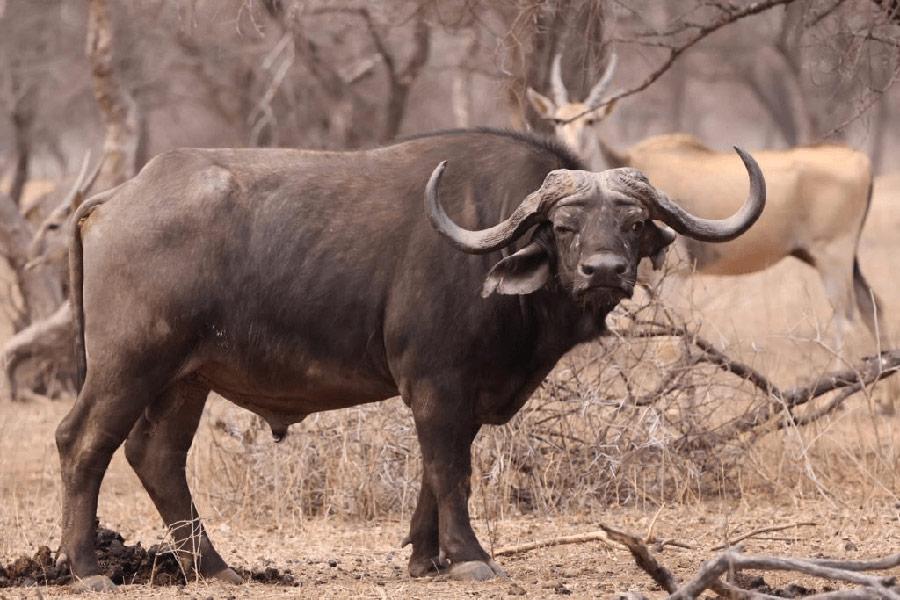South Africa is well known as a premium big game hunting destination, with over 10,000 hunters visiting the country annually. Why is South Africa such a popular safari hunting destination?
South Africa proudly boasts an enormous variety of unique huntable game animals. The safari hunting industry is exceptionally well organized and hunting lodges in South Africa are fully equipped to deliver on expectations of the international hunting community. Importantly, trophy hunting in South Africa is well-regulated and affordable, and local taxidermists are of a high caliber.
A hunting safari in South Africa is also family friendly and the safari is usually extended to focus on additional activities such as game fishing safaris and visiting popular tourist destinations.
Following the collapse of the South African Rand in 1994, foreign currency is in high demand, making commodity items and vacations very affordable. While the ANC Government is focused on corruption and emptying the state coffers, hunting safaris managed, marketed, and organized by South African ranch owners continue to be in high demand.
[DYNAMIC-BLOGTABLEOFCONTENT]
A Typical Hunting Safari in South Africa
First-time hunters to South Africa historically used to cross international waters and focus on African plains game hunting. A few hunting safaris later, they would be back for the big five African game animals. South Africa changes the hunter forever. Once you have visited South Africa and witnessed an African sunset sipping on a “cold one,” you will never be the same.
An Africa hunting trip must include one of the all-time favorite dangerous game species, the Cape Buffalo, also famously referred to as “The Widow Maker,” and for very good reason. Due to affordability, first-time hunters to South Africa can now explore African plains game hunting options and add a Cape Buffalo hunt. Of all the big game hunting safaris, hunting a Cape Buffalo is the most valuable for your “buck.”
What is a Group of Cape Buffalo called?
A group of Cape Buffalo is called a “gang,” or my personal favorite an “obstinacy.”
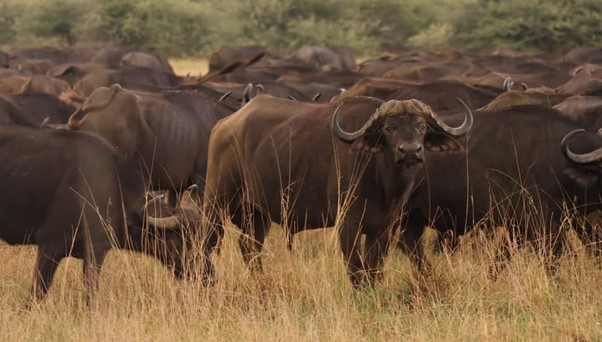
Cape Buffalo Hunts in South Africa: The Hunting Grounds
Big five African game animals in South Africa are hunted in fenced-off areas. Whether it be a large reserve or a ranch, there are no “free roam” areas. This then opens the door for the age-old debate of whether is off true “fair chase?”
The reality is that many of these areas are massive, over 100,000 acres in size. Hunters can go for weeks without seeing a fence. On these ranches, Cape Buffalo are born and raised, making them just as mean and dangerous as in free-range areas. A Cape Buffalo is not too concerned with a fence, a “Dugga Boy” will go just where he pleases, which of course can cause a few headaches for the ranch owner. In South Africa, it is not uncommon for the ranch owner to have to bring in an R44 helicopter and to chase them back.
Of course, we need to be able to draw the line somewhere. Going into a small ranch area, where the ranch owner wants to hunt or “take off” a few buffalo bulls in a ranch of a thousand acres, is not classified as a true Cape Buffalo hunt. This is just going in and killing Cape Buffalo that are used to being fed and managed. Of course, they will be just as dangerous.
Benefits of Cape Buffalo Hunts in South Africa
With the Cape Buffalo hunts taking place in a fenced-off area, the ranch owner will have a good indication of what size Cape Buffalo is available. When it comes to buffalo hunting, we are all aware that in this instance “size counts.” In South Africa, the wider the horn span, the higher the cost. Free-range Cape buffalo hunting will have no size restrictions.
As such, the African outfitter will be able to give the hunter options in terms of pricing, which will be based on horn measurements and average size. The smaller the spread, the lower the cost.
Again, this scenario will not apply to free-range Cape buffalo hunts, here you will take what Africa gives you and pay a set trophy fee.
The Cape buffalo hunt cost in a fenced-off area is lower than that of free range. In “wild Africa,” costs would increase due to location, cost of temporary shelters, logistics, government trophy fees, etc. In fenced-off areas, the duration of the hunting safari may also be over fewer days, reducing day fees and sundry costs. The ranch owner also has flexibility in determining the price, resulting in discount hunts becoming available. Not all big game hunters have the luxury of investing additional funds into free-range hunting opportunities. For some, their dream hunt may only consist of one African hunting trip.
Ranches in South Africa are also disability friendly, meaning that everyone has an equal opportunity to book their dream hunting safari. In fenced-off areas, temporary blinds can be constructed to assist with the hunt.
How much does a Cape Buffalo Hunting Safari cost?
In South Africa, hunters can obtain “discount hunts” for as low as US $8,500 for a seven-day safari.
A free-range Cape Buffalo hunting safari in Zimbabwe can cost more than US$ 18,000. In other countries, the safari hunting cost can be reduced when hunting non-exportable Cape Buffalo, which is free range.
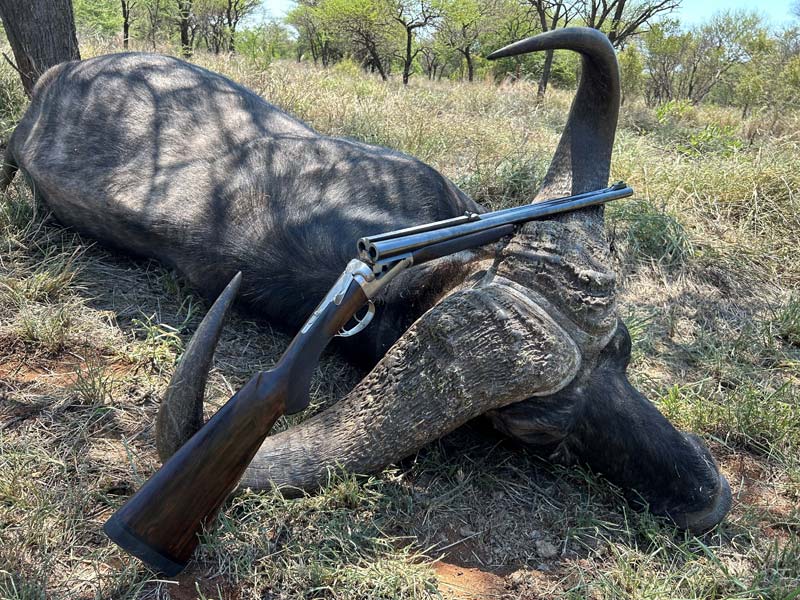
Why is South Africa focused on breeding bigger Cape Buffalo?
International hunters love South Africa as a big game hunting destination. It is down to economics. There is a demand for Cape buffalo hunting, so South African ranch owners increase the supply. When it comes to Cape buffalo, bigger is mostly better. Scientists believe that it was not historically unusual for Cape buffalo to have a spread of over 4,9 feet, but that they were all “shot out” by game hunters of long past.
Breeding Disease-Free Cape Buffalo
Consideration needs to be given to breeding disease-free Cape buffalo. The Kruger National Park in South Africa is home to more than 48,000 Cape buffalo. It is believed that more than 90% of the animals are infected with TB (Tuberculosis). Bovine TB was first found in Cape buffalo in 1990.
Treatment of TB in Cape buffalo in such large areas is impractical. The Parks Board ruled out culling the buffalo years ago, a practice that would be followed with domestic animals.
Cape buffalo that are privately owned or bought and sold need to be disease-free (TB, Foot and Mouth, and Rabies to name but a few) and remain in quarantine (isolation) before being transported.
Breeding of disease-free Cape buffalo also assists with relocation and supply of animals where populations have decreased due to poaching and civil wars in certain countries. Maputu Reserve in Mozambique has regularly been receiving Cape buffalo from South Africa since 2018 to replenish in line with carrying capacity and restocking available habitat.
How is South Africa breeding bigger Cape Buffalo?
It is all about genetics. Cape buffalo are evaluated on their horn width and physical size. Not all huge buffalo sire large offspring.
Buffalo in South Africa is sold on the auction (normally by catalog). If a ranch owner needs bigger or better to mix with the genetics of his buffalo cows, he will purchase a suitable breeding bull, or pay to have his cows inseminated.
In 2016, the most expensive sale of a Cape buffalo took place for a whopping price tag of US $12,2 million.
In 2016 when sold on auction, this Cape buffalo was still a young bull showing a huge amount of potential.
Meet Horizon, the “Super Cape Buffalo” with a spread of over fifty-six inches (image courtesy of NY Post)
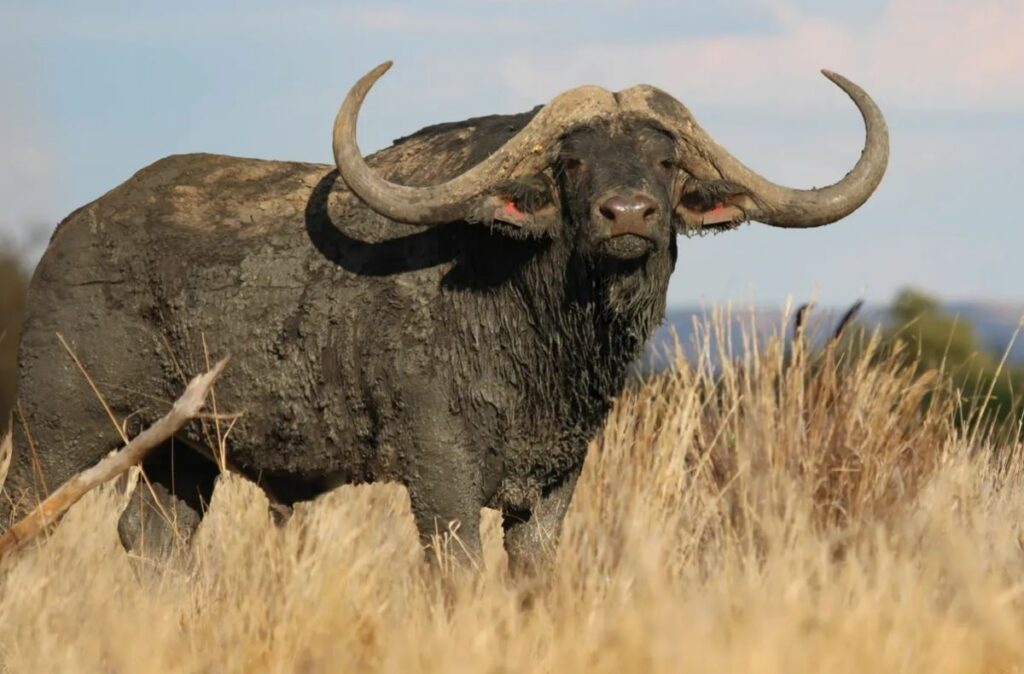
When Horizon impregnated a Cape buffalo cow, back in 2016 the cow’s value tripled, from approximately US $54,000 to immediately over US $170,000.
Horizon died a few years back due to a contaminated water supply.
Cape Buffalo Hunts, and the Demand for Trophy Animals in South Africa
Most big game hunters want a trophy Cape buffalo hunted in Africa on display in their trophy room. Hunting Cape buffalo in South Africa makes this very possible.
Due to the fenced hunting of Cape buffalo in South Africa, the African outfitter can guarantee the size of the buffalo, assuming of course that the hunter shoots the right animal.
When larger buffalo can no longer breed, they are sold off as hunting bulls. Often individual animals are marketed showing pictures of size, age, and horn shape, again opening the doors of the “free-range” Cape buffalo hunting debate. Just make sure the outfitter removes the ear tag before taking pictures.
It is now almost frequent practice for African outfitters to have bulls of over 48 inches available for the hunting safari, of course, they come with a price tag.
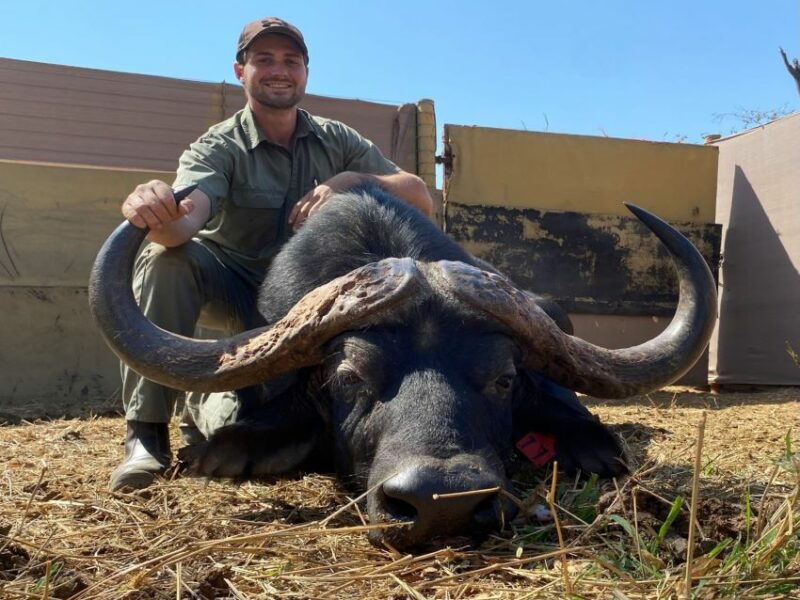
What Gun do you use to Hunt Cape Buffalo?
The minimum legal caliber in South Africa is a .375 loaded with three hundred grains. When it comes to buffalo hunting, it is always advisable to “bring more guns.”
A preferred choice is a larger caliber such as a .416 Rigby, .45 Lott, or any larger caliber double rifle. Buffalo hunting is dangerous work, up close and personal.
Irrespective of caliber, like hunting any of the big five African game animals, shot placement is critical.
The demand for Cape Buffalo Hunts in South Africa, is on the increase. Whether hunting Cape Buffalo in South Africa, Zimbabwe, Zambia, or Tanzania, make sure your Africa hunting trip includes the fearless Cape buffalo.
Author: PC van Wyk
